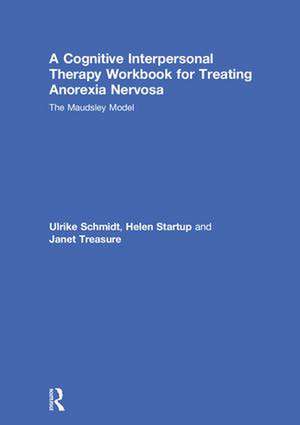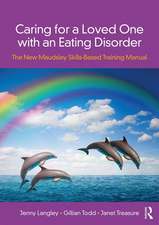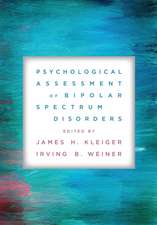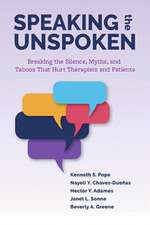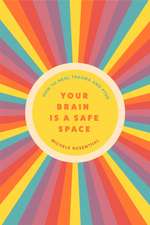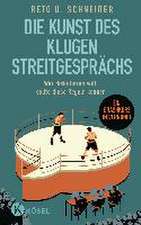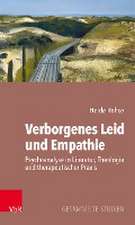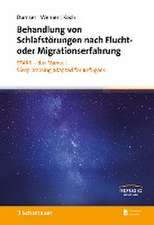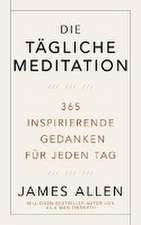A Cognitive-Interpersonal Therapy Workbook for Treating Anorexia Nervosa: The Maudsley Model
Autor Ulrike Schmidt, Helen Startup, Janet Treasureen Limba Engleză Hardback – 31 oct 2018
The approach described is recommended by the National Institute of Clinical and Care Excellence (NICE) as a first-line, evidence-based treatment for adults with anorexia nervosa. A Cognitive Interpersonal Therapy Workbook for Treating Anorexia Nervosa provides adults with anorexia nervosa and the professionals working alongside them with a practical resource to work through together.
The manual is divided into accessible modules, providing a co-ordinated, step-by-step guide to recovery. Modules include:
- Nutrition
- Developing treatment goals
- Exploring thinking styles
- Developing an identity beyond anorexia.
| Toate formatele și edițiile | Preț | Express |
|---|---|---|
| Paperback (1) | 185.16 lei 3-5 săpt. | +22.67 lei 5-11 zile |
| Taylor & Francis – 31 oct 2018 | 185.16 lei 3-5 săpt. | +22.67 lei 5-11 zile |
| Hardback (1) | 724.68 lei 6-8 săpt. | |
| Taylor & Francis – 31 oct 2018 | 724.68 lei 6-8 săpt. |
Preț: 724.68 lei
Preț vechi: 878.57 lei
-18% Nou
Puncte Express: 1087
Preț estimativ în valută:
138.69€ • 144.25$ • 114.49£
138.69€ • 144.25$ • 114.49£
Carte tipărită la comandă
Livrare economică 14-28 aprilie
Preluare comenzi: 021 569.72.76
Specificații
ISBN-13: 9781138831933
ISBN-10: 113883193X
Pagini: 256
Ilustrații: 46
Dimensiuni: 210 x 297 mm
Greutate: 0.63 kg
Ediția:1
Editura: Taylor & Francis
Colecția Routledge
Locul publicării:Oxford, United Kingdom
ISBN-10: 113883193X
Pagini: 256
Ilustrații: 46
Dimensiuni: 210 x 297 mm
Greutate: 0.63 kg
Ediția:1
Editura: Taylor & Francis
Colecția Routledge
Locul publicării:Oxford, United Kingdom
Public țintă
General, Professional, and Professional Practice & DevelopmentCuprins
Acknowledgements
Introduction
Chapter 1 The Background to MANTRA
Chapter 2 Getting Started
Chapter 3 No (Wo)Man is an Island – Working with Support
Chapter 4 Improving Your Nutritional Health
Chapter 5 My Anorexia Nervosa: Why, What and How?
Chapter 6 Developing Treatment Goals
Chapter 7 The Emotional and Social Mind
Chapter 8 Exploring Thinking Styles
Chapter 9 Identity
Chapter 10 The Virtuous Flower of Recovery from Anorexia
Appendix 1 Worksheets for Supporters
Appendix 2 Writing in Therapy- Information Sheet
Appendix 3 Writing Experiment Sheet
Appendix 4 Traffic Light Relapse Prevention Plan
Introduction
Chapter 1 The Background to MANTRA
Chapter 2 Getting Started
Chapter 3 No (Wo)Man is an Island – Working with Support
Chapter 4 Improving Your Nutritional Health
Chapter 5 My Anorexia Nervosa: Why, What and How?
Chapter 6 Developing Treatment Goals
Chapter 7 The Emotional and Social Mind
Chapter 8 Exploring Thinking Styles
Chapter 9 Identity
Chapter 10 The Virtuous Flower of Recovery from Anorexia
Appendix 1 Worksheets for Supporters
Appendix 2 Writing in Therapy- Information Sheet
Appendix 3 Writing Experiment Sheet
Appendix 4 Traffic Light Relapse Prevention Plan
Notă biografică
Ulrike Schmidt is Professor of Eating Disorders at King’s College London and a Consultant Psychiatrist in Eating Disorders at the South London and Maudsley NHS Foundation Trust.
Helen Startup is a Consultant Clinical Psychologist and Senior Research Fellow at the Sussex Partnership NHS Foundation Trust.
Janet Treasure is Professor of Psychiatry at King’s College London and a Consultant Psychiatrist in Eating Disorders at the South London and Maudsley NHS Foundation Trust.
Recenzii
The authors are amongst the most experienced clinician-researchers in the field of eating disorders. With the publication of A Cognitive Interpersonal Therapy Workbook for Treating Anorexia Nervosa: The Maudsley Model, they bring their treatment for anorexia nervosa to you. Whether you work through the workbook on your own or together with a therapist, you will be benefitting from the wisdom that can only come from decades of clinical experience.
The treatment approach and workbook emerged from listening carefully to patients and carers in order to understand their perspective and their needs for a successful treatment. The book carefully walks you down a path of recovery, richly augmenting text with exercises and illustrations to engage you in the process of achieving wellness. By including true stories from people who have recovered, the authors invite you to enter the recovery space of those who have successfully overcome the burden of anorexia nervosa.
They will help you transform your vicious flower of illness into a virtuous flower of recovery and help you to write your own story of who you can and will be once you leave anorexia nervosa behind. You will experience their empathy and understanding in every chapter of this book. A Cognitive Interpersonal Therapy Workbook for Treating Anorexia Nervosa: The Maudsley Model is an important evidence-based tool that is indispensable to your recovery journey.
Professor Cynthia Bulik, PhD, FAED, Distinguished Professor of Eating Disorders, University of North Carolina at Chapel Hill, Professor, Karolinska Institutet, Stockholm, Sweden
It gives me great pleasure to provide this endorsement of the MANTRA workbook. Working with people who are simultaneously embracing and battling anorexia nervosa is one of the hardest types of therapy I have encountered in thirty years of practice as a clinical psychologist across a number of clinical settings and conditions. When I first came across the emerging MANTRA approach in 2003, it was like a breath of fresh and invigorating air. It provided a validating and respectful approach, utilized the principles of motivational interviewing in the way material was presented, contained clear connections between the evidence and inclusion of a range of modules, and was associated with creative and engaging exercises that allowed for inclusion of collaborative work with a therapist.
Many years have now passed, and a body of solid evidence for the usefulness of MANTRA with anorexia nervosa has accumulated, such that it is now one of three recommended adult outpatient treatments in the 2017 NICE guidelines. This published workbook now gives people with lived experience of anorexia nervosa and therapists alike easy access to MANTRA by providing:
Professor Tracey Wade, Matthew Flinders Distinguished Professor of Psychology, Flinders University, Adelaide, Australia
The treatment approach and workbook emerged from listening carefully to patients and carers in order to understand their perspective and their needs for a successful treatment. The book carefully walks you down a path of recovery, richly augmenting text with exercises and illustrations to engage you in the process of achieving wellness. By including true stories from people who have recovered, the authors invite you to enter the recovery space of those who have successfully overcome the burden of anorexia nervosa.
They will help you transform your vicious flower of illness into a virtuous flower of recovery and help you to write your own story of who you can and will be once you leave anorexia nervosa behind. You will experience their empathy and understanding in every chapter of this book. A Cognitive Interpersonal Therapy Workbook for Treating Anorexia Nervosa: The Maudsley Model is an important evidence-based tool that is indispensable to your recovery journey.
Professor Cynthia Bulik, PhD, FAED, Distinguished Professor of Eating Disorders, University of North Carolina at Chapel Hill, Professor, Karolinska Institutet, Stockholm, Sweden
It gives me great pleasure to provide this endorsement of the MANTRA workbook. Working with people who are simultaneously embracing and battling anorexia nervosa is one of the hardest types of therapy I have encountered in thirty years of practice as a clinical psychologist across a number of clinical settings and conditions. When I first came across the emerging MANTRA approach in 2003, it was like a breath of fresh and invigorating air. It provided a validating and respectful approach, utilized the principles of motivational interviewing in the way material was presented, contained clear connections between the evidence and inclusion of a range of modules, and was associated with creative and engaging exercises that allowed for inclusion of collaborative work with a therapist.
Many years have now passed, and a body of solid evidence for the usefulness of MANTRA with anorexia nervosa has accumulated, such that it is now one of three recommended adult outpatient treatments in the 2017 NICE guidelines. This published workbook now gives people with lived experience of anorexia nervosa and therapists alike easy access to MANTRA by providing:
- Logically sequenced creative and self-reflective exercises that encourage the person with anorexia nervosa to develop an observer’s point of view and see the bigger picture, thus freeing them up to make different choices about how they respond to the anorexia nervosa;
- Clear advice and tips based on best-practice and informed by emerging research;
- Illustrative examples from people’s experiences with feeling confused by, and overwhelmed with, anorexia nervosa, and making inroads against this destructive disease.
Professor Tracey Wade, Matthew Flinders Distinguished Professor of Psychology, Flinders University, Adelaide, Australia
Descriere
Based on the authors' pioneering work and up-to-date research at London's Maudsley hospital, A Cognitive Interpersonal Therapy Workbook for Treating Anorexia Nervosa: The Maudsley Modelprovides adults with an eating disorderanorexia nervosa and the professionals working alongside them with a practical resource to work through together.
